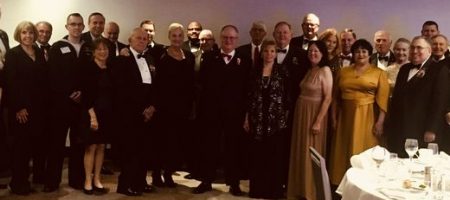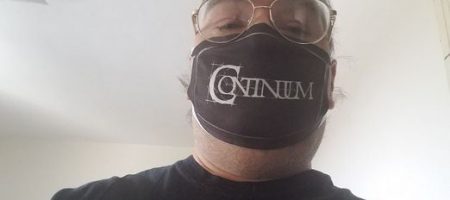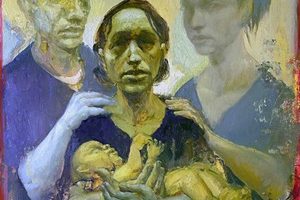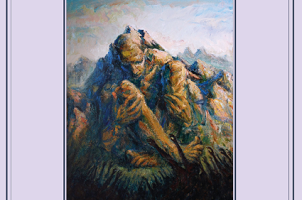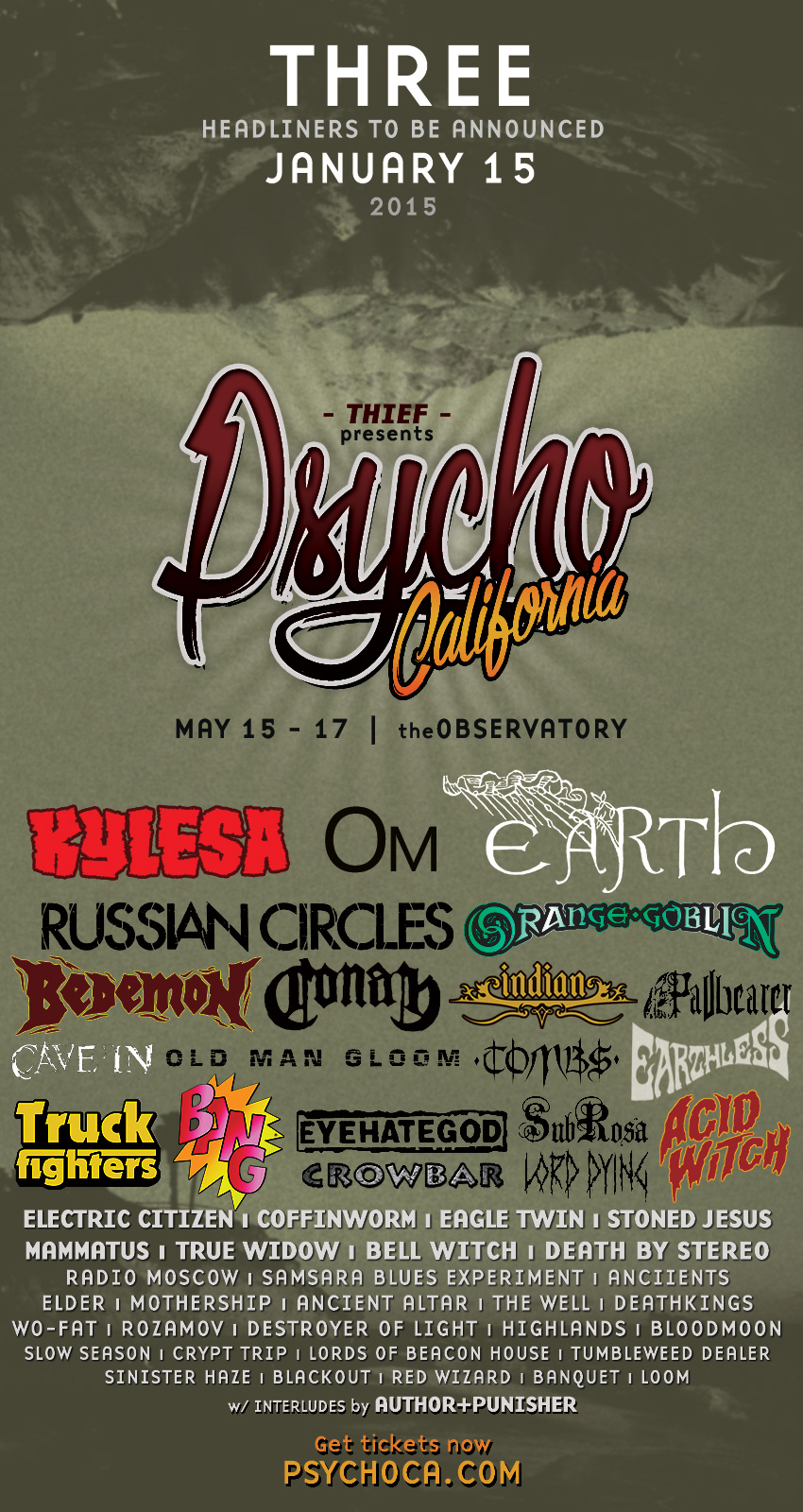Pallbearer – Another Rite of Passage
Sunday, 1st November 2020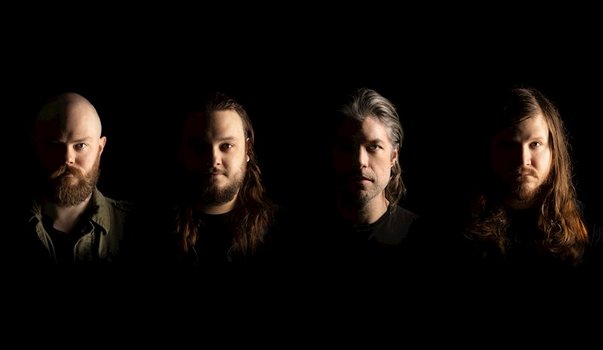
Asserting themselves as difference makers in the doom genre through melodic and progressive dynamic aspects, Pallbearer have made a potent name for themselves in a relatively short period of time. Heavy riffs that shake the foundations, thoughtful lead breaks, and vocal melodies that reach the deepest recesses of your mind – beyond the emotional lyrical content contained within their discography. Now aligning with Nuclear Blast, the band’s fourth studio album Forgotten Days keeps the quartet sharp – introducing tighter/shorter arrangements against their established epic pedigree to make for an exciting front to back listening experience.
We reached out to bassist Joseph Rowland to discuss the latest record, highlights with the group, signing with Nuclear Blast after years on Profound Lore, breaking through from the Arkansas scene, and what future people who participate in their Patreon campaign can look forward to for content down the line.
Dead Rhetoric: Forgotten Days is the fourth Pallbearer full-length. Where do you think the band wanted to explore in terms of sonic quality, tone, songwriting, or creative impulses on this set of material that differs from your previous work?
Joseph Rowland: Our last record Heartless I think was our sort of full exploration of how orchestrated we could get in terms of writing music that was so detailed. We were literally like writing so many layers of stuff that without a larger ensemble it would be impossible to play the way that it was on the recording live. Of course we ended up having to adjust slightly. This time around we wanted to write a record that was a lot closer to where Pallbearer as a live experience is like. Focusing more on the immediate impact and a rawer, heavier sound instead of an extremely polished and minutely detailed recording.
Obviously in terms of the methods of recording, it’s not like we went into a pretend garage like St. Anger, or revisit the band jamming in a garage like (Metallica) talk about in the movie Some Kind of Monster. It was intentionally more stripped down, the songs were intended to be a little less overtly complex. The nuances come in other ways in the songwriting.
Dead Rhetoric: Do you think it was a challenge to come up with some shorter songs, considering in the past you’ve been known for your epic-length material?
Rowland: Honestly, while it may have been challenging, it was a very exciting challenge. As time has gone on, we’ve matured as songwriters – at least from my perspective. Going in the opposite direction – lots of bands will start on the shorter end of the spectrum and go into epic-length things. Over the past several years, post-Heartless, with some of the singles we’ve written and released, we’ve gotten into more of a zone to focus on conciseness and tighter songwriting, and still be able to pull out the labyrinthine epics here and there. It’s us exploring another facet of our overall songwriting palate.
Dead Rhetoric: And where do you see the use of synthesizers in the band – as you’ve said that you’ve gotten more labyrinthine with the songwriting, where do you see the placement of these elements?
Rowland: We’ve always incorporated synthesizers, even since our very first record. We are not really able to incorporate it live without someone not playing their main instrument, we haven’t ever really gone off the deep on our full-lengths. We have released a couple of songs since the quarantine online that have been total re-envisioning’s of past songs with synths – that has its role, but not completely in the forefront. Where our interests lie as musicians, we are obsessed with them outside of the band. We like to use it to accentuate the song, but not go into full indulgence mode.
Dead Rhetoric: The song “Rite of Passage” has special significance to you, putting into words addressing your feelings over the loss of your mother more than a decade ago. How have you been able to process and push through this experience – as it’s never easy to lose a parent, but I’d imagine you didn’t intend to lose her while you were a student in college, correct?
Rowland: She passed… I had graduated a few years prior to that. It was a difficult thing to process not only because of the place in my life I was at, but because more or less within a year’s time from then, Pallbearer was starting to take a big chunk of my time. It was pushing my life and all our lives in a way that I don’t think any of us expected. It provided a convenient buffer for me not to have to assess who I really became because of her passing. A lot of the material I wrote on this album is about that, not just “Rite of Passage”. It’s addressed in “Riverbed” and “Caledonia” as well. A lot of this record is looking back on those memories and simultaneously addressing my mother and myself, just trying to comprehend who I’ve become.
Dead Rhetoric: Are there times where you have deep discussions with your fans about some of the material and their stories relating to the lyrics?
Rowland: Obviously I don’t want to go into great detail about that because I’m sure most people want things to be kept relatively private, but I have spoken to some fans over the years about their own personal losses. I’m no therapist, but if there is a way I can relate what’s happened in my life and how I’ve dealt with it in a healthy way, if I am able to help these people on their personal journeys through us then hopefully it’s a beneficial thing.
Dead Rhetoric: Michael Lierly, brother of your drummer Mark Lierly, handled the artwork – how did you arrive at this piece, as it’s quite different than previous pieces from past Pallbearer albums?
Rowland: We’ve been working with Michael for a number of years now, but when we came to him with this concept, we wanted an overvivid picture of the classic nuclear family from the 20th century. Distorted to show a decay happening to it, the thought of a perfect family fading away. There’s that element amongst the songs that I wrote, and the songs that Brent wrote as well.
Dead Rhetoric: Are there major differences between yourself and Brett as songwriters over the years for Pallbearer?
Rowland: Nope, I honestly think in a lot of ways Brett and I have a lot of synchronicity in the way the band has evolved over the years. Even as we’ve lived in pretty different geographical locations, when we get back together and rehearse, we are always on the same page I think. He and I have been playing music together for over fifteen years now. Maybe subconsciously we are able to fuel the directions that we are going in, it’s not a verbal communication at times. We’ve always ended up being on the same trajectory, there’s never been a time where there is a schism between us. We’ve always grown together in the band.
Dead Rhetoric: After establishing yourselves on Profound Lore, you’ve now signed with Nuclear Blast. How does it feel to gain strong support from respected record labels, and discuss the importance of a strong team in allowing Pallbearer as a band to concentrate more on the development of the music and items you want to push your time/energy into?
Rowland: First of all, it is amazing to have such support from such a legendary label. We are very fortunate to know Monte Conner, the president of Nuclear Blast. He is a huge Black Oak Arkansas fan, and we are as well. That was our bonding moment where we knew we wanted to push working with Monte. The other part of your question, it’s absolutely crucial that we have a strong team working together behind the scenes. A lot of our success as a band over the years I would give a massive amount of credit to people that have pushed us through the press, organized tours for us, even people on a totally informal level, fans who have been enthusiastic about what we are doing and sharing with other people who enjoy heavy music. I can’t say enough good things about the way people have supported us through the years, so I definitely want to give my gratitude for that.
Dead Rhetoric: What do you consider some of the career highlights for Pallbearer to this point – benchmark moments in terms of albums, tours, festival appearances, etc. where you felt like you were making more of an impact as musicians and ascending up the ranks in terms of impact/following?
Rowland: I think once we started playing some of the festivals more frequently. And the crowds started to get a little bit bigger, it was definitely … it was a cool feeling to see the expansion of the fanbase and see people really drawn into the music. In terms of recent stuff coming to mind, we played a show in Philadelphia beginning of last year where we played Sorrow and Extinction in its entirety, and that really felt like a pretty magical experience. We played at a venue we have played at before, but never headlining the show. It seemed like every single person there was so present, in the moment. It had a mystical aura about it, that stands out in my memory quite strongly.
Dead Rhetoric: Are there major differences in your eyes with the band live compared to what you are like in the studio?
Rowland: It’s tough to say. Every time we record we take a slightly different approach that’s informed by things that we’ve done before I think, the knowledge-base and experience grows so it’s a little bit different. The live environment is so emotional, and there’s this primal feeling that wells up when we are performing. As much as I love the recording process, it’s fascinating and invigorating in a lot of ways – I don’t think there has ever been a time in the studio where I’ve been so overcome by the sensation as it is live. When we are all locked in together – for me that’s the ultimate form of Pallbearer, when we are in that moment, totally in the pocket playing together live.
Dead Rhetoric: What would surprise us about Joseph D. Rowland as a person away from being a bass player, songwriter, and member of Pallbearer? Where do you think you are growing and changing most as a person?
Rowland: (laughs). Oh man, that’s a good question. I’m not sure if I have anything that mysterious about myself. I listen to copious amounts of Italian disco, European disco music. Maybe that’s my surprising element!
Dead Rhetoric: It seems like over the past decade there has been an explosion within the doom metal and progressive genres, especially with newer acts putting their own stake in the game. What are your thoughts on the evolution of these genres?
Rowland: To be honest, I listen to very little music within the (doom and progressive) genres. I know lots of bands that are throwing their hat into the ring, but I’m pretty far removed from what the current doom scene is like, apart from some of our personal friends like Spirit Adrift, we’ve known Nate for a while, but I’m not sure he would even consider them to be strictly doom metal. A lot of my associations with the genre are with people that I consider contemporary that we encounter when we are playing out.
My main stuff I listen to is from many years ago. I occasionally find something new that I like. Kraut rock, older progressive rock more than anything else. And some cosmic synth.
Dead Rhetoric: What concerns do you have about the world that we live in today? What do you think the average person needs to work on and think about most to make this world a better, safer, and healthier place to live in?
Rowland: I’m completely overwhelmed with the state of things in the world right now. It seems like it’s so rapidly becoming uninhabitable. I am also very angry that so many people have so much little respect for other people, and the way they have treated the pandemic. Refusing to show even the slightest amount of respect for other people, health and safety by refusing to wear a mask. The fact that people have been on this own bandwagon of putting their own ‘liberty’ over other people’s safety is telling of a world that is crumbling.
Dead Rhetoric: You currently live in Brooklyn, were there specific reasons why you moved there and how do things now work out within the band, being based in Arkansas?
Rowland: I had wanted to move from Arkansas for a long time, and I never intended on staying there permanently. When I had the chance to go, I made the move up here. In the past it was very easy to meet together, it’s a pretty short flight to Brooklyn back to Little Rock, it’s less than half a day with all the travel. Pre-pandemic when we needed to get together to rehearse for a tour, it would be a quick commute. Post-pandemic, that is being brought into question, and we are still deliberating the best way to get together to rehearse and do some sort of live stream event. It’s being figured out because the logistics of it are pretty complex.
Dead Rhetoric: Was it hard for you to break through and establish yourselves in Arkansas, especially considering there wasn’t as much of an underground or metal scene at first?
Rowland: In terms of the Arkansas scene, there’s always been a small and closely-knit metal scene. In the Little Rock area especially, I think that a lot of the guys there were part of the musical generation ahead of us, they were always good and accepting of us. There is often not that many bands at the same time, and a lot of the members share themselves with other bands. The bands that preceded us, some of those members have played in Pallbearer at one point. We’ve always played projects with some of those guys. It’s not like we were being stonewalled by the new kids on the block, it’s been an open and friendly scene. It was akin to what I imagine the punk scene being like, not elitist with any metal gatekeeper sort of mentality.
Dead Rhetoric: Discuss the significance of Pink Floyd in your world – and how you arrived at doing a cover of “Run Like Hell” for a single release in 2018?
Rowland: We are obviously highly influenced by Pink Floyd. I think the David Gilmour element is prevalent in the way that we approach some of the guitar solos within the band. The melodicism and the restraint (are) definitely very inspiring. The “Run Like Hell” cover came about in an unusual way because we didn’t have a choice of what song to do. We got approached by the record label that was doing a compilation – and the song we were interested in doing, another band had already done it somehow. I don’t remember how “Run Like Hell” was the one we got- we tried to approach it in an unexpected way. We thought people think we would do it in this monolithic, dirgy way – we just decided to do a Deep Purple meets Iron Maiden way. It was fun, and a little bit outside our normal trappings I guess.
Dead Rhetoric: What’s on the agenda for Pallbearer over the next twelve months or so as far as promotion, videos, keeping sharp as we continue to handle this pandemic globally?
Rowland: We’ve been doing something entirely new for us for the past couple of months. We are starting a Patreon account, and doing alternate versions of songs. And releasing a totally different mix of Heartless, digitally through that. We’ve been doing some podcasting where we do stories from the road, and we are going to have some special guests, different people that we are buddies with and have worked with over the years. We will be working towards whatever we have next in the performance space. Something in the live stream realm before something physical. I have my fingers crossed that we will be on stage within the next twelve months, whether that is in the US or not I don’t know.











